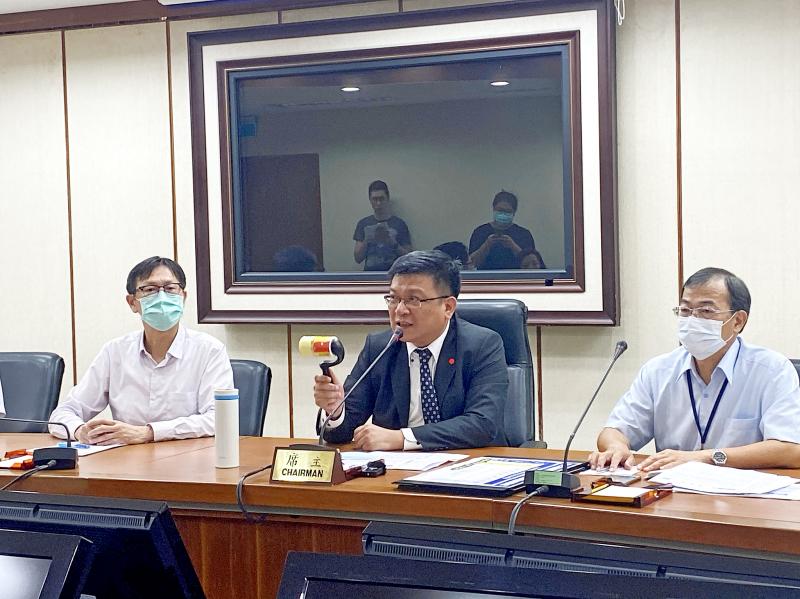Deputy Minister of Economic Affairs Tseng Wen-sheng (曾文生) yesterday condemned the Taichung City Government for sanctioning Taiwan Power Co (Taipower, 台電) for restarting the No. 2 generator at the Taichung Power Plant.
Voicing the ministry’s support for the state-run utility, Tseng accused local authorities of political maneuvering.
“The Taichung City Government has been on Taipower’s case since last year... They are only setting up more and more obstacles to prevent Taipower from ensuring a steady energy supply for the nation,” Tseng told a news conference in Taipei.

Photo: Huang Pei-chun, Taipei Times
After imposing multiple fines on Taipower due to excessive coal use, the city government last year revoked two of the company’s operating licenses for the No. 2 and No. 3 generators at the plant, a move that was later countermanded by the Environmental Protection Administration (EPA).
The city government last week fined Taipower NT$2 million (US$67,431) for restarting the No. 2 generator, followed by a heavier NT$20 million fine on Monday, while the Taichung Environmental Protection Bureau yesterday threatened to take legal action against Taipower chairman Yang Wei-fuu (楊偉甫).
“The operation of Taipower’s No. 2 generator is completely legal in the eyes of the law [following the EPA’s ruling]... Furthermore, the No. 2 generator and No. 3 generator are the least-polluting generators at the Taichung Power Plant due to recent improvements,” Tseng said.
The city government’s actions are far from helpful in the reduction of air pollution in central Taiwan, he added.
Asked whether Taipower would be willing to negotiate the shutdown of other generators instead, Tseng gave a firm “no.”
“The point is flexibility, we need [to be able to operate] all 10 generators to guarantee this kind of flexibility,” Tseng said, adding that Taipower has promised to simultaneously run a maximum of nine generators during summer.
“While we can only have eight to nine generators working at the same time, we must have [enough] leg room to maintain a 10 percent power reserve,” Taipower vice president and spokesman Hsu Tsao-hua (徐造華) said, adding that the increasing energy consumption in Taichung should also be taken into consideration.
“Taichung has consumed an average of 31,500 gigawatt-hours last year, higher than the Taichung Power Plant’s annual output of 30,000 gigawatt-hours,” Hsu said.

Hon Hai Precision Industry Co (鴻海精密) yesterday said that its research institute has launched its first advanced artificial intelligence (AI) large language model (LLM) using traditional Chinese, with technology assistance from Nvidia Corp. Hon Hai, also known as Foxconn Technology Group (富士康科技集團), said the LLM, FoxBrain, is expected to improve its data analysis capabilities for smart manufacturing, and electric vehicle and smart city development. An LLM is a type of AI trained on vast amounts of text data and uses deep learning techniques, particularly neural networks, to process and generate language. They are essential for building and improving AI-powered servers. Nvidia provided assistance

DOMESTIC SUPPLY: The probe comes as Donald Trump has called for the repeal of the US$52.7 billion CHIPS and Science Act, which the US Congress passed in 2022 The Office of the US Trade Representative is to hold a hearing tomorrow into older Chinese-made “legacy” semiconductors that could heap more US tariffs on chips from China that power everyday goods from cars to washing machines to telecoms equipment. The probe, which began during former US president Joe Biden’s tenure in December last year, aims to protect US and other semiconductor producers from China’s massive state-driven buildup of domestic chip supply. A 50 percent US tariff on Chinese semiconductors began on Jan. 1. Legacy chips use older manufacturing processes introduced more than a decade ago and are often far simpler than

STILL HOPEFUL: Delayed payment of NT$5.35 billion from an Indian server client sent its earnings plunging last year, but the firm expects a gradual pickup ahead Asustek Computer Inc (華碩), the world’s No. 5 PC vendor, yesterday reported an 87 percent slump in net profit for last year, dragged by a massive overdue payment from an Indian cloud service provider. The Indian customer has delayed payment totaling NT$5.35 billion (US$162.7 million), Asustek chief financial officer Nick Wu (吳長榮) told an online earnings conference. Asustek shipped servers to India between April and June last year. The customer told Asustek that it is launching multiple fundraising projects and expected to repay the debt in the short term, Wu said. The Indian customer accounted for less than 10 percent to Asustek’s

Gasoline and diesel prices this week are to decrease NT$0.5 and NT$1 per liter respectively as international crude prices continued to fall last week, CPC Corp, Taiwan (CPC, 台灣中油) and Formosa Petrochemical Corp (台塑石化) said yesterday. Effective today, gasoline prices at CPC and Formosa stations are to decrease to NT$29.2, NT$30.7 and NT$32.7 per liter for 92, 95 and 98-octane unleaded gasoline respectively, while premium diesel is to cost NT$27.9 per liter at CPC stations and NT$27.7 at Formosa pumps, the companies said in separate statements. Global crude oil prices dropped last week after the eight OPEC+ members said they would